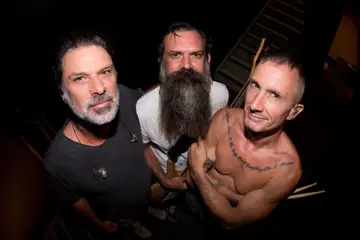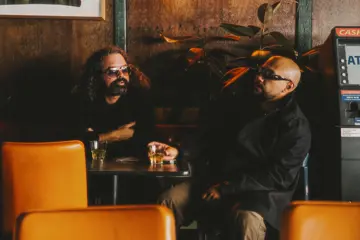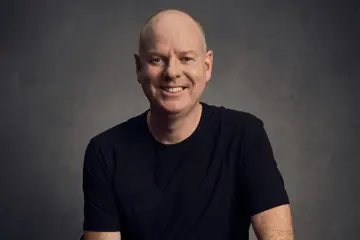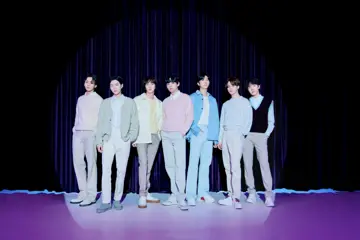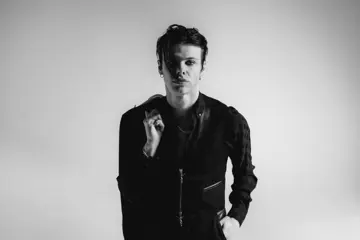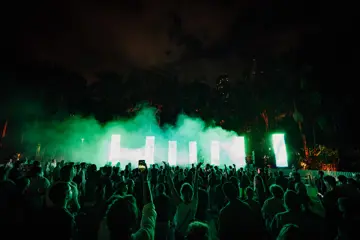The French Film Festival is one of the biggest events on the local cinematic schedule, and the 28th edition brings with it 45 features, opening in Melbourne and Sydney this week, then going national.
As always, it boasts the icons of French cinema — Huppert, Binoche, Deneuve, Depardieu — but, also, the new guard: with the great child actor Kacey Mottet Klein graduating to tortured adolescent roles in Being 17 and Keeper, and imminent über-celebrity Lily-Rose Depp shining in her first non-Kevin-Smith films, The Dancer and Planetarium.
As always, the quality of FFF films is a mixed bag, from top-shelf auteurism to commercial comedies. Here’s the Film Carew guide to everything I’ve seen.
150 MILLIGRAMS

Sidse Babett Knudsen gets her Brockovich on in this David vs Goliath tale of one driven doctor battling Big Pharma, which hits all the familiar beats on its way to justice being served.
A BAG OF MARBLES

Don't miss a beat with our FREE daily newsletter
Ultra-twee remake of the Jacques Doillon film, a true tale about a pair of knockabout Jewish scamps attempting to survive WW2 occupation. Christian Duguay — fresh off a Belle & Sebastian sequel — razes away any rough edges or uncomfortable truths for the generically ‘inspirational’. It’s most notable as a kind of anti-Boyhood: a wartime saga that spans years, but in which its main kids never grow nor change; forever, obviously, the same age.
BEING 17

Heaving adolescent hormones rage in André Téchiné’s latest work of homoeroticism, where a pair of strapping teenage lads first fight, then fuck. Set in a remote Alpine outpost — with duly stunning scenery — there’s a social current coursing through the collision; the thoughtful script, co-written with the brilliant Céline Sciamma, carrying genuine weight. It amounts to Téchiné’s best film since 1994’s The Wild Reeds.
DAGUERROTYPE

Kiyoshi Kurosawa is often called a ‘horror’ director, but he’s more a filmmaker of unease, summoning the ineffable and letting things linger. Daguerrotype — his first film made outside Japan, which stars Tahar Rahim and Olivier Gourmet — follows Journey To The West as an unconventional ghost story. It’s set in a towering Gothic mansion, the shadowy home of an obsessive, early-photography practitioner. He’s haunted, by both memories and ghosts, but this is no genre-work; Kurosawa’s stilled, hushed, patient picture mixing high-art minimalism and matinée classicism.
THE DANCER

The Dancer, a film charting the life and times of Loïe Fuller, is a very trad biopic, enlivened by moments of occasional lyricism, just as its subject was driven by dogged determination and physical sacrifice, which begat fleeting moments of rapture on stage. Soko plays the titular dame, who briefly became the toast of Belle Époque Paris; and Lily-Rose Depp plays her frenemy, Isadora Duncan.
FAREWELL, MY QUEEN

Benoît Jacquot’s 2013 film is a powdered-wig period piece shot in the court of Versailles, but don’t let all the frocks, quivering cleavage, Marie-Antoinette-ism, palace intrigue, and dazzling screen sirens — Léa Seydoux, Virginie Ledoyen, Diane Kruger — suggest it’s something generic. Instead, its portrait of the tumult that engulfed Versailles in the first days of the Revolution uses its real setting to trend towards vérité: Jacquot following Seydoux’s servant along endless hallways, lit up, dimly, by natural light. It’s an on-the-ground portrait of history in flux; in which reality impinges on a cloistered fantasy world.
HEAL THE LIVING

The web-of-interrelated-characters ensemble movie became a no-go zone after the haggis Crash, but here Katell Quillévéré fashions something tender and human out of the premise. Her characters are stitched together by a tragic accident and an organ transplant, but there’s no heavy-handed emotional manipulation. Instead, Quillévéré — making a big step up from Suzanne — finds quiet, respectful ways of touching on grieving, sadness, and the weight upon the doctors who deal in life and death.
IN BED WITH VICTORIA

The FFF is perennially stuffed with romantic comedies; many are best avoided. But Justine Trier’s artful riff on the direst of genres is sweet, strange, rarely strained, and scored by Chilly Gonzales. Virginie Efira has a career long on bringing unexpected life to cut-out rom-coms, but here she’s given a role — “the queen of drama queens” — filled with contradiction, complexity, and calamity; both star and script heading into territories aggressively absurd.
THE INNOCENTS

In a remote, snow-driven Polish outpost in the wake of WW2, Lou de Laâge plays a ridiculously-attractive Red Cross nurse who’s drawn into the hidden world of a cloistered abbey, where pregnant runaways are sheltered, and both charity and cruelty are divined by God. The shadow of Paweł Pawlikowski’s Ida lingers over Anne Fontaine’s latest feature — due to the setting, subject, and presence of Agata Kulesza, Joanna Kulig, and Dorota Kuduk — but it’s not the only superior film The Innocents calls to mind: its final sequence set to Max Richter’s On The Nature Of Daylight, a composition now synonymous with Denis Villeneuve’s Arrival.
IT’S ONLY THE END OF THE WORLD

Xavier Dolan just won Best Director at the Césars for this, but it’s far-and-away his worst film. It’s a witless, poorly written, stageplay-born, August: Osage County-wannabe, family-yells-at-each-other drama that opens with that most tired device: a family’s black-sheep son returns home after years away. And, get this, he’s a playwright. A famous cast — Gaspard Ulliel, Vincent Cassel, Marion Cotillard, Léa Seydoux, Nathalie Baye — and Dolan’s directorial élan do little to enliven a film built on clichéd characters and entry-level symbolism.
A JOURNEY THROUGH FRENCH CINEMA

Bertrand Tavernier’s functionally titled documentary is part memoir, part cine-essay; charting French films from the 1930s through ’60s, as he went from boyhood enthusiast to budding director. It discusses all the auteurs you expect —from Renoir to Godard— but it’s not a work re: celebrity. Instead, Tavernier is more concerned with film grammar, the way influence passes from filmmaker to filmmaker; making the whole play like a three-hour cinema studies lecture.
KALINKA

It’s an Obsessive-Man-Who-Won’t-Let-Go movie: Daniel Auteuil playing the real-life father who, after his teenage daughter’s suspicious death in 1982, spent 30 years crusading for her case to not be forgotten, her killer brought to justice. It’s simple moral stuff — virtuous crusade in the face of a failing, corrupt legal system — delivered with punch, and pleasing brevity: director Vincent Garenq daring to tell this tragic true tale in 86 economic minutes.
KEEPER

A sterling, psychologically rich, and unexpectedly respectful rendition of a simple scenario: a pair of 15-year-olds deciding to go forward with a pregnancy. Guillaume Senez’s film carries an air of social and dramatic realism, and comes blessed with astounding lead turns from Galatéa Bellugi and Kacey Mottet Klein.
MAX & LÉON

There’s something to be said for comic enthusiasm. This zany wartime farce is a very broad comedy, but director Jonathan Barré and stars Grégoire Ludig and David Marsais verily hurl themselves into their various sitcom hijinks. Max & Léon happily mocks wartime tropes — the fight scenes are ridiculous, the haughty caricatures more so — with the horrors of war played as bothersome nuisance. The best gags are when the film gets meta, breaking the fourth wall, or turning a job making propaganda movies for the Nazis into a series of ridiculous, jaunty PSAs.
MERCENARY

There are not many realist sports-movies, but Sacha Wolff’s debut is an intimate take on the peddled flesh of sporting imports, reminiscent of Anna Boden and Ryan Fleck’s Dominican baseball tragedy, Sugar. Here, Toki Pilioko plays a New Caledonian rugby prospect who ends up playing in provincial France, both heroised and dehumanised by locals as steroid-fed muscle-for-hire. Some of Wolff’s dramatic turns are depressingly conventional, but the film has a real sense of place and character, and an understanding of sport in a sociopolitical context.
THE ODYSSEY

It’s hard not to think of The Life Aquatic With Steve Zissou when you see Lambert Wilson, red-beanie-adorned, sailing the seas in The Odyssey. It’s a big-money biopic — veritable César-bait — about the life of Jacques-Yves Cousteau; a widescreen, decade-spanning saga of oceanic adventure, father/son drama, the birth of the environmental movement, and Audrey Tatou in unconvincing wigs/wrinkles. There’s a sincerity that matches its subject, director Jérôme Salle presenting a brightly coloured fable in which the sea is a lurid blue canvas for adventure, the underwater world a temple for spiritual awakening.
PLANETARIUM

After her brilliant nuclear affair Grand Central, Rebecca Zlotowski amps up the ambition with Planetarium, where Natalie Portman and Lily-Rose Depp play psychic sisters in 1930s Paris; part-seers, part-grifters, all All-American sass. They’re drawn into a world of early cinema, Portman groomed as a budding starlet; Planetarium, as much as anything, about the collapse of French cinema upon the arrival of WW2. The production design, photography, and direction all pop, but the story sometimes seems a li’l silly.
SAINT AMOUR

Gérard Depardieu and Benoît Poelvoorde play wine-swigging, dairy-farmin’, father/son ‘hicks’ in this latest knockabout road-trip from Belgian absurdists Benoît Delepine and Gustave Kervern. They approach their itinerate picture with a sense of genuine adventure, wandering far from its initial set-up. Rather than some self-contained Sideways, the film’s structure is erratic, its veerings unexpected, its climax both ridiculous and sweet.
SLACK BAY

After years of peddling the ultimate in feelbad rural miserablism, Bruno Dumont’s done a radical about-face, turning his hand to old-fashioned comedy. And, here comes Slack Bay, a slapstick period-piece filled with zany mugging, wacky walks, and countless pratfalls, in which the sight of a fat man rolling down a sand dune is assumed to be the peak of hilarity. A trio of French stars — Fabrice Luchini, Valeria Bruni Tedeschi, Juliette Binoche — all get their panto on, Binoche’s scenery-chewing turn turned up to 11. For large stretches, the flick plays like a parade of insufferable buffoonery, but when things take a cannibalistic, anarchistic turn late, Dumont shows that he remains more comfortable — and more successful — wielding cinematic savagery.
THINGS TO COME

Isabelle Huppert may’ve just garnered her first-ever Oscar nomination, but fans of French cinema know she’s been at the pinnacle of her profession for decades. She’s remarkable, again, in the latest film for Mia Hansen-Løve, in which, in the wake of a largely amicable divorce, she feels lost. As always, Hansen-Løve’s greatest gift, as auteur, is her disinterest in familiar storytelling beats and screenplay structures; Things To Come’s title suggesting that in her films, as in life, what happens next is rarely what’s expected.
THE UNKNOWN GIRL

After two decades of turning out searing socio-realist fables, the Dardenne brothers dare to mix things up, a little, with their latest feature, which keeps the vérité mise-en-scène, moral wrangling, and dressed-down acting, but is, essentially, a murder-mystery. Here, Adèle Haenel plays a young doctor who grows obsessed with the death of a local girl who had knocked on the door of her medical clinic.
A WOMAN’S LIFE

Fans of rural realism will delight in Stéphane Brizé’s unlikely follow-up to The Measure Of A Man, whilst those expecting a period-piece’s frocks and frivolity will find it slow, alienating going. Adapting a Guy de Maupassant tale of a tragic heroine in the early 19th century, Brizé ditches much of the plot and dialogue, impressionistically moving between scenes of springtime frolicking and bad-weather brooding; the film less about drama, more about weather, natural light, and the passage of seasons.

